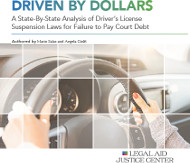9/29/2017
Report Tracks Cash Incentive For States To Suspend Driving LicensesReport details state-by-state policies on suspending driving licenses as a means of collecting money for courts.

Driver's license suspension laws around the country are having unexpected negative effects, a report released Tuesday by the Legal Aid Justice Center found. According to the Virginia-based group, forty-six create a vicious cycle of debt by denying motorists their right to drive when they are unable to pay speeding ticket fines or other court-enforced debts that have nothing to do with driving.
"Those who can't pay, lose their licenses and consequently suffer a never-ending cycle of debt and incarceration, so long as the law forces them to choose between driving illegally and forsaking the needs of their families," the center's litigation director Angela Ciolfi said in a statement.
The biggest offenders are Michigan, North Carolina, Virginia, Tennessee and Texas, where more than five million licenses have been suspended for failing to pay tickets or other court debt. These individuals usually live from paycheck to paycheck and are hit hard when their license is used as a form of debt collection.
"It is often said that driving is a privilege," the report noted. "But for most people, the ability to drive legally to jobs, medical appointments, places of worship, and the grocery store is no more a privilege than it is to work, eat, pray, and care for their families."
California, Georgia, Kentucky and Wyoming are the only states that do not suspend licenses for debt collection purposes. In the rest of the country, suspensions last until the debt is paid, often without any limit on the duration of the punishment. In nineteen states, the law makes suspension mandatory upon the failure to pay a ticket. The US Department of Justice last year filed a brief calling the practice unconstitutional.
The American Association of Motor Vehicle Administrators (AAMVA) agrees that driver's license suspensions should only be used to take dangerous drivers off the road, not enforce unrelated laws.
"Eliminating driver license suspensions for non-highway safety violations will significantly reduce the burden on departments of motor vehicles, law enforcement, the courts and society," the AAMVA working group on licensing found. "When a law enforcement officer encounters a suspended driver, their ability to help ensure the safety of drivers on the roadways and their availability to respond to calls for service are reduced."
California's ban on license suspensions for non-payment of tickets took effect in June.
A copy of the report is available in a 1mb PDF file at the source link below.


